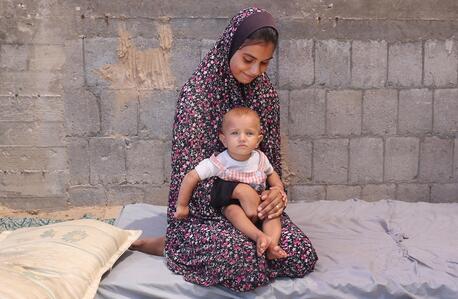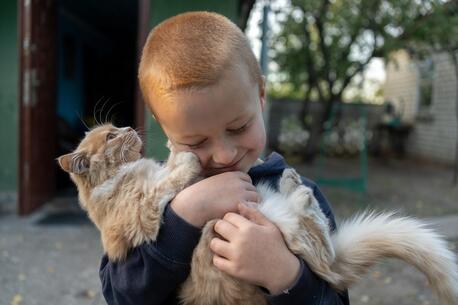
For Ukraine's Children, a Frightening New Reality
The war in Ukraine, now in its second week, is taking a terrible toll on children's lives and well-being. Children who were playing and going to school are now coping with the devastating consequences of armed conflict.
Millions could be caught up in the violence as fighting intensifies in and around urban centers. Parents desperate to get their children out of harm's way are leaving everything behind, making their way toward border crossings. At an air raid shelter in Lviv, western Ukraine, less than 50 miles from the border with Poland, local volunteers have donated toys, food and gifts for the children there, like 7-year-old Elvira. She doesn't know the name of her hometown or which country she's going to, but she knows she doesn't want to leave her home.
Half a million children and their families have already fled Ukraine for neighboring countries. The crisis has sparked a massive population displacement that could soon become one of Europe's largest refugee crises since World War II.
"While conflict continues, that's the reality," said UNICEF spokesperson James Elder. "And while that's the reality, we need to support."
UNICEF is working to meet the urgent needs of children caught up in armed conflict
Damage to Ukraine's civilian infrastructure has left hundreds of thousands of people without safe water or electricity. Hundreds of homes have been damaged or destroyed; schools, orphanages and health centers are reported to have sustained heavy damage.
Children are especially vulnerable to being killed or maimed when weapons and explosive munitions are used in populated areas. Since February 24, 17 children have been killed and 30 have been injured, according to the United Nations. Actual numbers are likely to be much higher.
"The use of explosive weapons in cities could quickly turn this crisis into a catastrophe for Ukraine's children," said Afshan Khan, UNICEF's Regional Director for Europe and Central Asia. "There are no armed operations of this scale that do not result in children being harmed. The consequences will be tragic."
"The only way out of this unfolding tragedy in Ukraine is for the conflict to end." — Afshan Khan, UNICEF Regional Director for Europe and Central Asia
UNICEF is working with partners in Ukraine to reach vulnerable children and families with essential services, including water and sanitation, immunization and health care, schooling and learning, and emergency cash assistance. Ten mobile teams are providing psychosocial care to children and caregivers, as well as case management support for the most vulnerable families. UNICEF is trucking safe water to conflict areas and prepositioning health, hygiene and emergency education supplies as close as possible to families near the contact line.
Working closely with UNHCR, UNICEF is also scaling up its response to provide critical support to children and families arriving in neighboring countries: Belarus, Czech Republic, Hungary, Moldova, Poland, Romania and Slovakia. Coordinating with local authorities, UNICEF is setting up 26 "Blue Dot" safe spaces along key travel corridors, where families in transit can go for information and emergency services. Staff at the centers will also work to identify unaccompanied and separated children and ensure their protection.
"UNICEF is on the ground, doing its best to meet children's basic needs, but the only way out of the unfolding tragedy in Ukraine is for the conflict to end," said Khan.
UNICEF is appealing for $276 million for its programs inside Ukraine and an additional $73 million to assist children in neighboring countries. Help UNICEF reach the most vulnerable with lifesaving services. Please donate.
Top photo: On Feb. 28, 2022, 7-year-old Elvira sits on a pile of bedding in a crowded air-raid shelter in Lviv, western Ukraine. "I don't remember where my home is," she said. Her family are fleeing as war escalates in Ukraine. © UNICEF/UN0599197/Golinchenko. Video edited by Tong Su for UNICEF USA.
HOW TO HELP
There are many ways to make a difference
War, famine, poverty, natural disasters — threats to the world's children keep coming. But UNICEF won't stop working to keep children healthy and safe.
UNICEF works in over 190 countries and territories — more places than any other children's organization. UNICEF has the world's largest humanitarian warehouse and, when disaster strikes, can get supplies almost anywhere within 72 hours. Constantly innovating, always advocating for a better world for children, UNICEF works to ensure that every child can grow up healthy, educated, protected and respected.
Would you like to help give all children the opportunity to reach their full potential? There are many ways to get involved.





